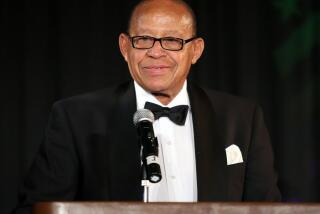KPFK Reporter’s ‘New Life’ Ended in Murder
- Share via
Friends described him as a man on a mission to capture the voices of the disenfranchised: gang members, welfare mothers, junkies.
Whenever he could, Michael Taylor shoved his clunky tape recorder into the faces of ordinary folk on the street. Even as he battled homelessness and a drug habit, Taylor enrolled in 1993 in radio station KPFK’s 18-month apprenticeship program. There, he found a new life as a street reporter.
So when Taylor was found shot to death execution style in a junk-strewn vacant lot in south Los Angeles, friends were stunned.
“He was a very lovely and soft-spoken guy,” KPFK general manager Mark Schubb said this week. “A lot of people had tremendous affection for him here. . . . That he would be murdered this way is beyond imagination.”
Gregarious and sharply focused on his work as a volunteer programmer, the 45-year-old Taylor made friends fast at the Studio City-based public radio station, operated by the Pacifica Radio Foundation.
“He fulfilled our mission beautifully of bringing voices to the air that otherwise would not be heard,” Schubb said.
Taylor’s body had no identification when it was found April 23 near South Victoria Avenue, his hands tied behind his back. Neighbors say they heard gunshots around 1:30 a.m. and called police, who discovered Taylor not far from railroad tracks in the area.
Los Angeles Police Det. Steve Watson said officers had to wait until late last week to get more information on Taylor’s identity.
“Unless you’re O.J. Simpson, a toxicology report doesn’t come back that fast,” Watson said.
Still uncertain, police and friends said, is what Taylor, a Los Angeles resident, was doing at the location, and whether his death was the result of a possible business deal gone wrong.
Officers said Taylor’s 1973 yellow Volkswagen Beetle is still missing.
Neither Taylor’s two daughters nor his girlfriend were available for comment.
Watson said police have ruled out robbery or Taylor’s liberal political and social radio commentaries as a motive in the slaying.
“We do not believe it was a robbery,” Watson said. “Usually when someone is bound and shot, it doesn’t fit [that] description.”
But Kwaku Person-Lynn, an ex-KPFK programmer and friend of Taylor, said he is still waiting for more information on the killing before deciding whether Taylor’s radio work was a factor.
“Because he was passionate and politically active, Michael might have made some enemies along the way,” Person-Lynn suggested.
Schubb said Taylor had been away from KPFK for three months working on an outside project that Schubb was unfamiliar with.
He doubted Taylor was involved in anything illegal that might have gotten him killed.
“Michael really had gotten his life together,” Schubb said. “We all want to know how this happened to him.”
Last year, friends and colleagues raised enough money to send Taylor to Philadelphia to cover the controversial trial of black author and accused murderer Mumia Abu Jamal. They say Taylor was aware of both the rewards and the risks involved with grass-roots reporting in urban communities.
“He knew what he wanted to do,” Person-Lynn said. “He didn’t seem to be concerned about materialism like some radio people. He was concerned about African American issues. Uplifting his people seemed to be his primary interest.”
Taylor had been scheduled to lead a workshop at an anti-hunger conference for youth Wednesday in the Wilshire district. His workshop, titled “No News Is Not Good News,” was to cover the role the media played in hunger issues.
The 500 participants at the conference observed a moment of silence in honor of Taylor, and the room where he was to speak was kept open at the request of the other conference organizers.
Times correspondent Maki Becker contributed to this story
More to Read
Sign up for Essential California
The most important California stories and recommendations in your inbox every morning.
You may occasionally receive promotional content from the Los Angeles Times.










